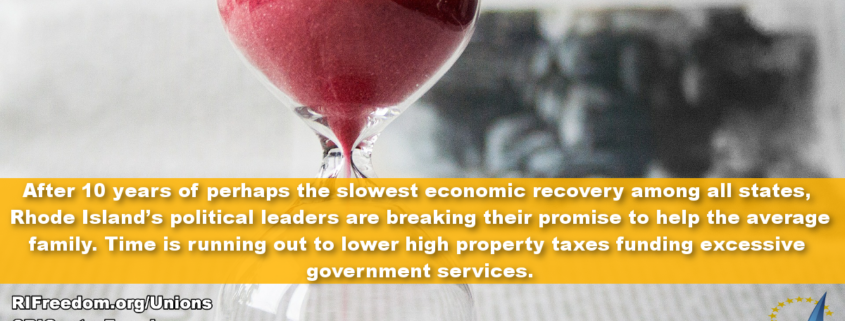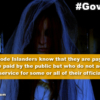NEW: Center Publishes Municipal Summary of its “Public Union Excesses” Report
Municipalities Across RI are Burdened with $590 million in Excess Costs… Not counting liabilities for paying people not to work!
Providence, RI— The #1 reason why local property taxes are up to 25% higher than they need be, is because of the $590 million in “excessive” costs, shared by municipalities across Rhode Island, for collectively-bargained government services, negotiated by government unions. This according to the landmark report, Public Union Excesses, released by the RI Center for Freedom & Prosperity in early May.
Additionally, these same municipalities are also burdened with a liability not often discussed – payments due to government workers who are allowed to “cash in” on their overly-generous and unused allowed “absences” – sick days, personal days, and other compensated leave time – as specified in their unions’ collective bargaining agreements … another $163 million cost heaped upon local taxpayers.
To underscore these local costs, the Center today published a 4-page summary of its Public Union Excesses report, which focuses on the municipal costs of collective-bargaining with government unions. All related material can be found at www.RIFreedom.org/Unions.
“This summary report is a must-have reference for all local school committee and city and town council members if they are looking for ways to control the exploding costs of collectively-bargained contracts with their municipal unions,” advised Mike Stenhouse, the Center’s CEO. “If you would like print copies, just let us know.”
In Lincoln for example, one table on the summary lists the estimated $13.1 million in excessive costs, while another table lists the $4.3 million owed for paying workers not to work. In East Greenwich, the costs are $9.6 million and $.9 million respectively.
A bar-chart in the summary shows that most public sector employees often enjoy 50% more sick days than their private sector counterparts. Compounding the effect, government workers are usually allowed to carry-forward far more of their accumulated sick days – which can be cashed in each year or upon retirement.




Leave a Reply
Want to join the discussion?Feel free to contribute!